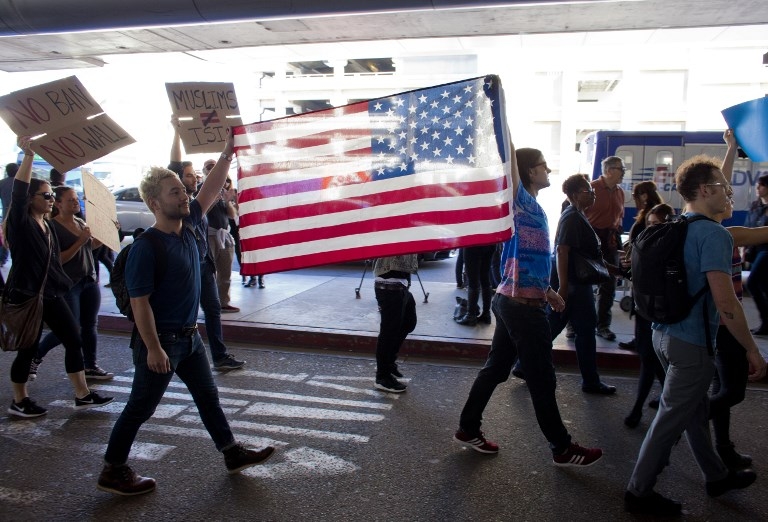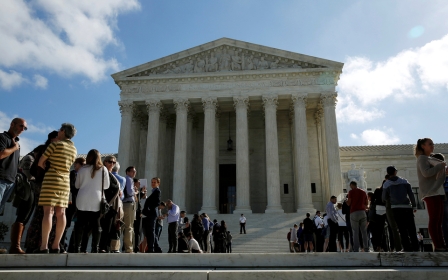Trump ban 2.0: Making America less safe, again

US President Trump’s Muslim ban went into effect last week, barring Muslim immigrants and visitors from six Muslim-majority countries (Iran, Libya, Somalia, Sudan, Syria and Yemen) entering the United States.
The fact that this ban would have prevented zero terrorist attacks on US soil in the past 20 years is all the proof you need to know that this has nothing to do with countering terrorism
This nonsensical, discriminatory and most likely unconstitutional measure will do nothing to prevent or disrupt unforeseeable terrorist attacks. Rather, it will deny refugees their rights under international law to resettlement, deny America some of its best future citizens, and, at its most personal, will prevent and disrupt mostly Arab and Persian relatives of American citizens from attending weddings, graduations, birthdays and funerals.
But the purpose of the Muslim ban was never about making America safer. It was always about sating and rewarding Trump’s racist and xenophobic base. It was always about lofting a middle finger towards followers of Islam, accompanied with the subtext “Screw you, Muslims”.
The fact that this Muslim ban would have prevented zero terrorist attacks on US soil in the past 20 years is all the proof you need to know that this so-called counter-terrorism measure has nothing to do with countering terrorism, and everything to do with tawdry political opportunism.
While Trump has given his “deplorable” Confederate flag-waving base a reason to praise their commander, he, in fact, has made America less safe, escalating the terrorist threat against the United States, and in doing so, Trump has forsaken his one sacred duty as commander-in-chief: to keep the American people safe from attack.
The most vital intelligence
Counter-terrorism is the greatest challenge facing those who are given the job of preventing attacks by both state and non-state actors on American soil: the US intelligence agencies.
The threat from state actors are easily identifiable. We know who they are and their respective capabilities. Individual terrorists, on the other hand, are not just those who are known to authorities today, but also those who might carry out an attack in the future.
“The bullseye of this intelligence target – an individual terrorist plot – lacks the size and signatures of most other targets,” observes Paul Pillar, a 28-year veteran of the Central Intelligence Agency.
As such, counter-terrorism efforts depend enormously on all source intelligence. From SIGINT (intercepting electronic communications) to HUMINT (cultivating human intelligence collection efforts) to painstaking analysis of collected data, intelligence is the frontline of defence against terrorist threats.
One of the most vital forms of human intelligence, however, comes in the guise of foreign liaison relationships. Simply put, US intelligence agencies cannot be in all places, all the time where the Islamic State (IS), al-Qaeda, and the like exist and operate.
“Foreign governments fill this gap, acting as a force multiplier,” Daniel Byman, a counter-terrorism analyst at Brookings, wrote in May. “Allied intelligence services also have a huge advantage given their knowledge of local languages and cultural awareness.”
Former CIA director John Brennan has emphasised US dependence on foreign liaison relationships, telling talk show host Charlie Rose: “Our cooperation with foreign liaison quietly achieves significant results. Working together, we have disrupted terrorist attacks and rolled back groups that plot them, intercepted transfers of dangerous weapons and technology, brought international criminals to justice and shared vital intelligence and expertise on everything from the use of chemical armaments in Syria to the downing of the Malaysian airliner over Ukraine.”
In 2005, the CIA acknowledged that its most successful strategy to combat terrorism was “persuading and empowering foreign security services to help”. The CIA deputy director of operations also testified in Congress that nearly every capture or killing of a suspected terrorist outside Iraq since the 9/11 attacks – “more than 3,000 in total” – had come as a result of assistance from foreign intelligence services.
In 2010, an al-Qaeda-led plot to blow up two cargo planes over the United States was disrupted only at the last minute and thanks to intelligence and interdiction brought by Saudi Arabia. More recently, a Wall Street Journal report found that US efforts to counter al-Qaeda have come to depend heavily on the Saudi intelligence network “that stretches deep within Yemen’s tribal areas”.
Burning bridges, endangering lives
The relationship US intelligence agencies have with their foreign counterparts is very much dependent on the relationship and goodwill the US administration has with the governments of these respective countries.
In bringing about a ban on Muslim immigrants and visitors entering the US, the Trump administration has done more than put a strain on these critical diplomatic ties: it has positively made the US a pariah state in the eyes of many.
Put simply, countries throughout the Muslim world now have far less incentive to cooperate and collaborate with the United States’ 'war on terror'. In this light, Trump’s Muslim ban can only be interpreted as a massive self-defeating blow.
Moreover, the Western world is arguably entering its most dangerous phase in its misguided efforts to defeat extremist groups like IS and al-Qaeda, with one report estimating that more than 1,000 to 15,000 European fighters who travelled to Syria and Iraq have now returned to their home countries. Without critical intelligence collected from non-European allies, this threat cannot be mitigated.
In short, the need for good intelligence from Muslim-majority countries has never been greater, but rather than build better relationships, Trump would rather burn bridges and endanger American lives in the pursuit of scoring cheap political points with his dwindling support base.
- CJ Werleman is the author of Crucifying America, God Hates You. Hate Him Back, Koran Curious and is the host of Foreign Object. Follow him on twitter: @cjwerleman
The views expressed in this article belong to the author and do not necessarily reflect the editorial policy of Middle East Eye.
Photo: Protesters gather in January 2017 at Los Angeles International Airport's Tom Bradley terminal to demonstrate against President Trump's executive order effectively banning citizens from seven Muslim-majority countries (AFP)
New MEE newsletter: Jerusalem Dispatch
Sign up to get the latest insights and analysis on Israel-Palestine, alongside Turkey Unpacked and other MEE newsletters
Middle East Eye delivers independent and unrivalled coverage and analysis of the Middle East, North Africa and beyond. To learn more about republishing this content and the associated fees, please fill out this form. More about MEE can be found here.





